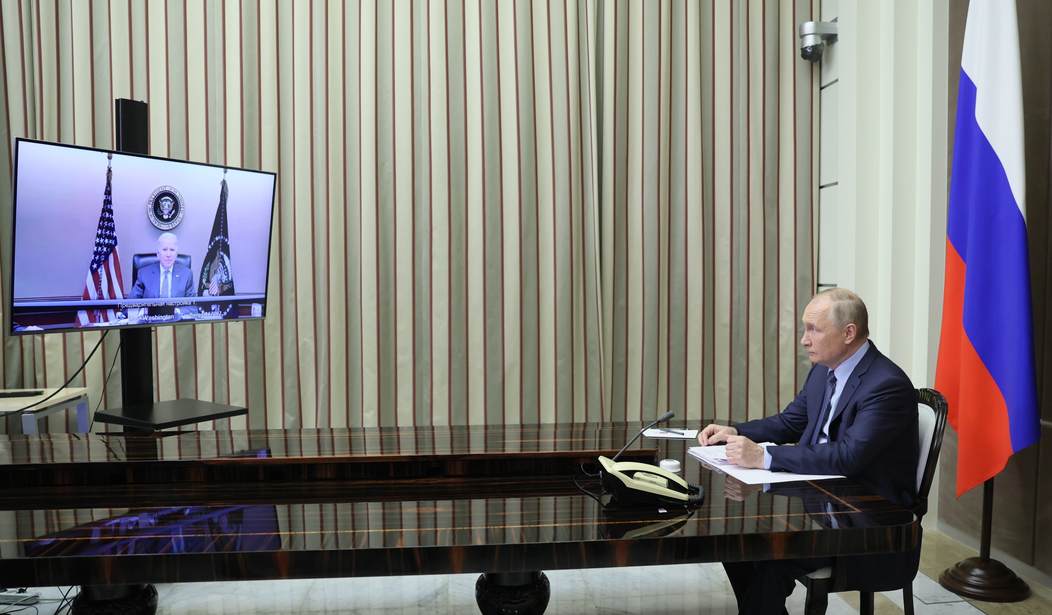A few days ago Sen. Marco Rubio hinted on Twitter that something was “off” with President Putin. Rubio didn’t say where he was getting that information but his position on the Senate Intelligence Committee and his hesitance to say more suggested he was alluding to classified information.
It’s not clear what Rubio was hinting at but we do know that sources close to French President Macron, the western leader who has spent the most time with Putin lately, reveal that Putin seems to have changed lately. Reuters reported on Macron’s impressions earlier this month:
In the first detailed read-out on Monday’s meeting in Moscow from the French delegation, the sources said Macron had been struck by how different Putin was to the man he had met in his summer residence on the French Riviera three years ago…
“These more than five hours of talks make us realise how different the Putin of today was to the Putin of three years ago,” said the source, who was briefed on the contents of the Macron-Putin talks and spoke on condition of anonymity…
Putin also dwelled on the 2014 Maidan Revolution – which saw the flight of a pro-Russian leader amid mass street protests – and on the 2019 election of Volodymyr Zelenskiy as Ukraine’s president.
“He says it was a coup and that Zelenskiy is controlled by the United States,” the first source said.
The Wall Street Journal had a similar story about a week ago:
“Mr. Macron found that Putin was more rigid, more isolated, and had basically gone into a sort of ideological and security-minded drift,” a French official said.
That something appears to be off with Putin’s mindset can even be seen by looking at photos of his recent meetings with Macron:
A picture of Macron being Putin his place. pic.twitter.com/CbFmUNnd9y
— Leiyan (@AlvinLeiyan) February 24, 2022
Putin speaks to Macron, explains Russian actions in Ukraine -Kremlin https://t.co/2VcVxCoPAK pic.twitter.com/XTPMdpMdVO
— Reuters (@Reuters) February 24, 2022
But it’s not just foreign leaders. His own generals get the same treatment:
Moscow: Latest photo of President Putin with his top generals released by Kremlin. 👀 pic.twitter.com/RYS5FTPOFM
— OSINT Insider (@OSINT_Insider) February 27, 2022
Russia’s foreign minister:
Lavrov reporting to Putin on Russia's quest to get western countries to agree to its security demands. Look how long the table is! pic.twitter.com/eCE5EvFxtM
— max seddon (@maxseddon) February 14, 2022
With all of that in mind, what do you estimate the chances of success are for Russian citizens who protest the invasion or even for the few Russian oligarchs who have decided to speak out against it?
Russian billionaires Mikhail Fridman and Oleg Deripaska have broken ranks with the Kremlin and called for an end to Russia’s war in Ukraine.
Fridman, who was born in western Ukraine, wrote in a letter to staff that he wanted the “bloodshed to end.”…
Fridman’s call for peace was echoed by Deripaska, a billionaire who made his fortune in the aluminum business.
“Peace is very important! Negotiations need to start as soon as possible!” Deripaska said Sunday in a post on Telegram.
Financial Times Moscow Bureau Chief Max Seddon has a piece up today about why even the oligarchs can’t do much about Putin these days.
As Russia’s tanks rolled into Ukraine last week, Vladimir Putin gathered the country’s top businessmen in the Kremlin’s ornate Hall of the Order of St Catherine to discuss their response to the economic shocks that would follow.
The Russian president, seated about 20ft away in a conspicuous social-distancing measure, told them he had “no other choice” but to invade Ukraine — and, if they wanted to keep their businesses, neither did they, according to people briefed on the meeting.
“It was a pointless meeting. The main idea was to explain himself. The explanation was: ‘I get it, but I didn’t have any other way out.’ That’s really what he thinks,” one of them said…
“Imagine they go to complain to Putin,” said a diplomat from a European country where several Russian oligarchs own large assets. “They say, ‘Can you please revise your policy? I lost $4bn of my $5bn’. Putin says, ‘Do you want to keep the $1bn?’”
Whatever it is that is going on with Putin, his rigid, paranoid and defensive behavior means there may be no one who can press him to take a different course. Those who try could wind up in jail or worse as government critics and journalists have a habit of winding up dead in Russia. Indeed, one of the oligarchs mentioned above pointedly refrained from any direct criticism of Putin saying it was too risky:
Mr Fridman said the conflict in Ukraine should end as soon as possible, but avoided questions about outright condemnation of President Vladimir Putin’s actions.
“Please, don’t push me to comment,” he said, adding it would be not just “my personal risk, but also a risk for my colleagues and staff”.
He said his companies had tens of thousands of staff in Russia, Ukraine and the UK. “It’s a very sensitive issue. We have a dozens of partners and I do not have a right to put all of them at risk.”
Things really are that simple in Russia at this point.







Join the conversation as a VIP Member